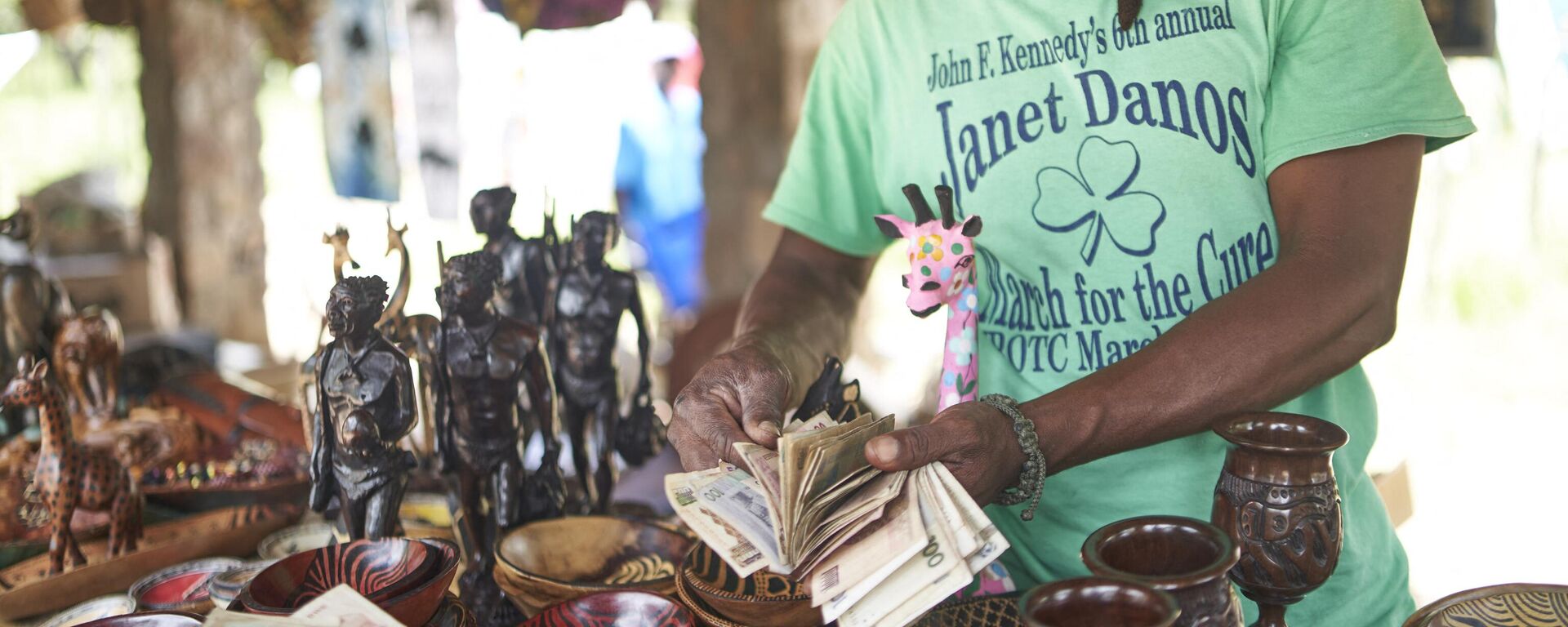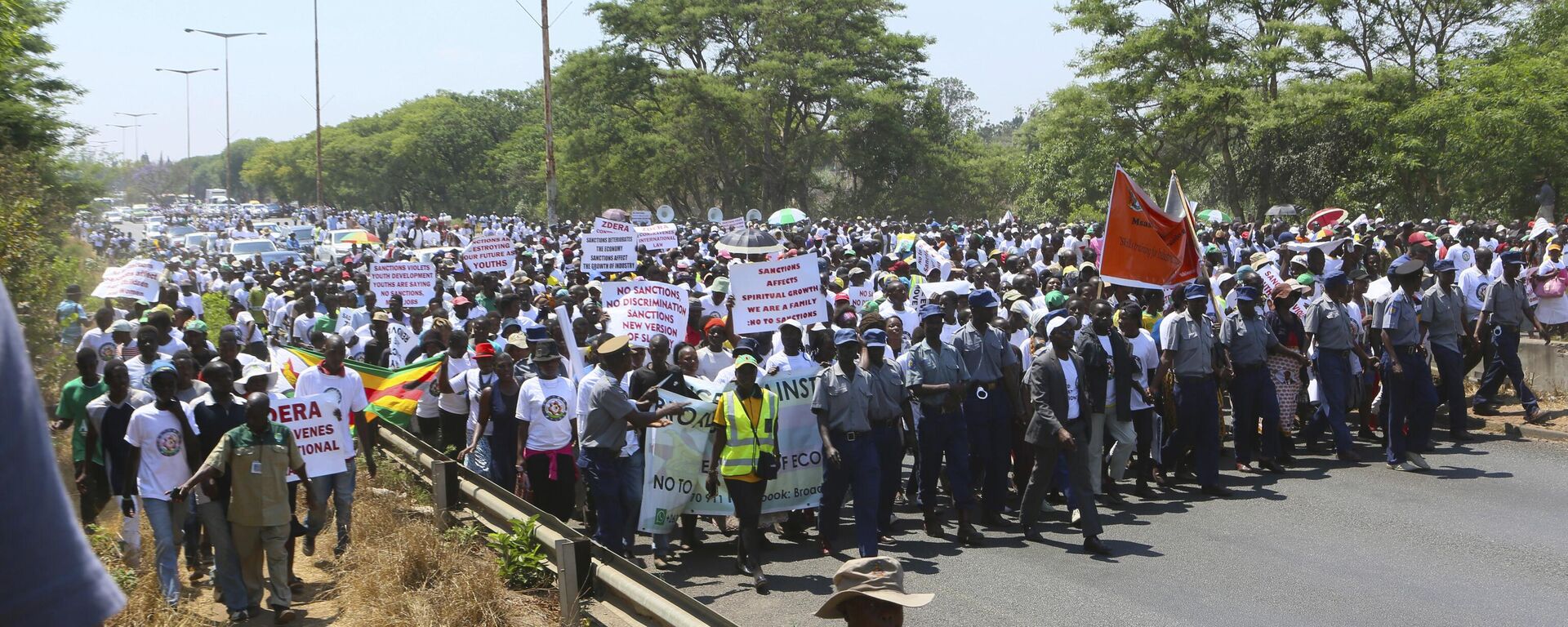https://en.sputniknews.africa/20231026/rising-from-ashes-zimbabwe-is-not-alone-in-fight-against-illegal-western-sanctions---activist-1063081146.html
'Rising From Ashes': Zimbabwe Is 'Not Alone' in Fight Against 'Illegal' Western Sanctions - Activist
'Rising From Ashes': Zimbabwe Is 'Not Alone' in Fight Against 'Illegal' Western Sanctions - Activist
Sputnik Africa
For over 20 years, Zimbabwe has been under the sanctions imposed by the United States and the European Union due to alleged human rights violations and a lack... 26.10.2023, Sputnik Africa
2023-10-26T14:30+0200
2023-10-26T14:30+0200
2023-10-26T14:30+0200
zimbabwe
southern africa development community (sadc)
southern africa
sanctions
us sanctions
united states (us)
russia
martin zharare
brics
african union (au)
https://cdn1.img.sputniknews.africa/img/07e7/0a/19/1063084062_0:0:3071:1728_1920x0_80_0_0_be5bca6c2711294c8ea0e9ae2079aaaf.jpg
As October 25 marked the fifth anniversary of the Anti-Sanctions Day, established by the SADC in 2019 in a bid to express its solidarity with Zimbabwe, which has been under Western sanctions for over 20 years now, the regional body as well as the African Union (AU) reiterated their calls for immediate lifting of the unilateral restrictions. The call for lifting of the sanctions "rests on the backdrop of growing concern over the impact these sanctions continue to pose on the country and the SADC region," according to a SADC statement.Pondering the issue of the sanctions' effects on the Southern African country and the sub-region as a whole, Martin Zharare, the executive director of Citizens Against Economic Sanctions (CAES), an organization advocating for the lifting of restrictions to ease the burden on the Zimbabwean people, said in an interview with Sputnik Africa that the decimation of Zimbabwe's economy has influenced not only the country itself, but the whole region, creating an influx of Zimbabweans seeking better opportunities in neighboring countries.As a result, the SADC community has come together to denounce "American hegemony," "colonization," and foreign policy, to rally against the sanctions, and to assert Africa's right to self-determination and independence, according to Zharare.Zharare has pointed out that "this day is very significant to the people of Zimbabwe and Africa as a whole because we are now joining hands as Africa. We are now joining hands as the black people. We are now joining hands as the people, the custodians of our land, in defiance of American hegemony."The CAES executive director further noted that Zimbabwe and other countries facing American sanctions, such as Russia, Venezuela, Cuba and Iran, are united in their support for the Zimbabwean people. These nations, along with India, China, and African states, stand in solidarity against the sanctions imposed on Zimbabwe, he noted.It's noteworthy that SADC's call for the lifting of the unilateral sanctions imposed by the West was supported by the Chairperson of the African Union Commission, Moussa Faki Mahamat, who reiterated "the longstanding AU demand for the immediate and unconditional lifting of sanctions."For over two decades, the Southern African country has been under the restrictive measures imposed by the US and the EU following one of the rounds of Zimbabwe's Land Reform Program in 2000, which was introduced allegedly violating human rights in the country.The program was officially aimed to address historical disparities in land ownership by redistributing land between black subsistence farmers and the white minority of European ancestry in a fairer way. However, it was subject to criticism from the Western countries due to reported violations during land expropriations.Although the US and the EU claimed that the measures targeted only the state's officials and did not influence the local population, ordinary Zimbabweans have been facing difficulties as the sanctions "hampered [the country's] ability to import the necessary medical equipment, medicines, and food from global markets," according to the SADC.In its report regarding the impact of the restrictions on Zimbabwe, the regional bloc highlighted that the US and the EU punitive measures are "illegal and unjustified" as they "violate Article 41 of the United Nations Charter, which states that sanctions can only be decided on by the UN Security Council." The latter had failed to impose sanctions against the African state as two permanent members of the council, China and Russia, voted against a draft resolution on the matter.Zharare also pointed out that the United Nations has not sanctioned Zimbabwe, emphasizing the "illegality" of the unilateral sanctions imposed by the US and the EU against his country. Commenting on the West's motives behind sanctions against the African state, Zharare argued that the Western countries were driven by a desire for the country's land and natural resources, particularly its mineral wealth.The CAES chief has also criticized Washington's use of power and control of financial systems to impede the independence and human rights in other countries under the pretext of promoting democracy.Elaborating on the US dominance, he stressed that in order to combat it, it is necessary to strengthen Africa-BRICS cooperation as the world power dynamics are shifting.Zharare expressed confidence that Zimbabwe, together with its global allies and its bid for membership of BRICS (Brazil, Russia, India, China and South Africa), will see a brighter future.The CAES executive director pointed out that it is important that the world understands that its help is needed "so that [the] freedom, [the] peace, [the] unitary state of Zimbabwe cannot be disturbed and destroyed by the imperialists." He added that the US' time "has arrived" and "Zimbabwe is rising from the ashes."
https://en.sputniknews.africa/20231025/sanctions-on-zimbabwe-historical-perspective--contemporary-impact-1063069048.html
https://en.sputniknews.africa/20230621/zimbabwean-sanctions-fighter-tells-us-youre-times-up-youre-bullyings-up-1060050175.html
zimbabwe
southern africa
united states (us)
russia
Sputnik Africa
feedback@sputniknews.com
+74956456601
MIA „Rossiya Segodnya“
2023
Muhammad Nooh Osman
https://cdn1.img.sputniknews.africa/img/07e7/04/0a/1058467512_0:0:1280:1280_100x100_80_0_0_ec723833bcbfcaed2e21952965ad99e4.jpg
Muhammad Nooh Osman
https://cdn1.img.sputniknews.africa/img/07e7/04/0a/1058467512_0:0:1280:1280_100x100_80_0_0_ec723833bcbfcaed2e21952965ad99e4.jpg
News
en_EN
Sputnik Africa
feedback@sputniknews.com
+74956456601
MIA „Rossiya Segodnya“
Sputnik Africa
feedback@sputniknews.com
+74956456601
MIA „Rossiya Segodnya“
Muhammad Nooh Osman
https://cdn1.img.sputniknews.africa/img/07e7/04/0a/1058467512_0:0:1280:1280_100x100_80_0_0_ec723833bcbfcaed2e21952965ad99e4.jpg
zimbabwe, southern africa development community (sadc), southern africa, sanctions, us sanctions, united states (us), russia, martin zharare, brics, african union (au), european union (eu), africa insight
zimbabwe, southern africa development community (sadc), southern africa, sanctions, us sanctions, united states (us), russia, martin zharare, brics, african union (au), european union (eu), africa insight
'Rising From Ashes': Zimbabwe Is 'Not Alone' in Fight Against 'Illegal' Western Sanctions - Activist
Muhammad Nooh Osman
Writer/Editor
For over 20 years, Zimbabwe has been under the sanctions imposed by the United States and the European Union due to alleged human rights violations and a lack of democracy in the country. According to the Southern African Development Community (SADC) and the United Nations, the sanctions affected Zimbabweans' access to basic necessities.
As October 25 marked the fifth anniversary of the Anti-Sanctions Day, established by the SADC in 2019 in a bid to express its solidarity with Zimbabwe, which has been under Western sanctions for over 20 years now, the regional body as well as the African Union (AU) reiterated their calls for immediate lifting of the unilateral restrictions.
The call for lifting of the sanctions "rests on the backdrop of growing concern over the impact these sanctions continue to pose on the country and the SADC region," according to
a SADC statement.Pondering the issue of the sanctions' effects on the Southern African country and the sub-region as a whole,
Martin Zharare, the executive director of Citizens Against Economic Sanctions (CAES), an organization advocating for the lifting of restrictions to ease the burden on the Zimbabwean people, said in an interview with
Sputnik Africa that the decimation of
Zimbabwe's economy has influenced not only the country itself, but the whole region, creating an influx of Zimbabweans seeking better opportunities in neighboring countries.
As a result, the SADC community has come together to denounce "American hegemony," "colonization," and foreign policy, to rally against the sanctions, and to assert Africa's right to self-determination and independence, according to Zharare.
"On this very specific day [the SADC Anti-Sanctions Day] where SADC, the Southern African Development Community, has come to the aid of the government and the people of Zimbabwe to say, 'remove these illegal sanctions on Zimbabwe'. Why? Because SADC has realized that these sanctions are not only affecting the Republic of Zimbabwe and the people of Zimbabwe," the CAES chief said.
Zharare has pointed out that "this day is very significant to the people of Zimbabwe and Africa as a whole because we are now joining hands as Africa. We are now joining hands as the black people. We are now joining hands as the people, the custodians of our land, in defiance of American hegemony."
"Africa is standing up to fight with us," he argued.
The CAES executive director further noted that Zimbabwe and other countries facing American sanctions, such as Russia, Venezuela, Cuba and Iran, are united in their support for the Zimbabwean people. These nations, along with India, China, and African states, stand in solidarity against the sanctions imposed on Zimbabwe, he noted.
"Look at all the countries that America is coming to bulldoze their policies on them. All these people are sending their voices to say, 'we stand with Zimbabwe'," Zharare said.
It's noteworthy that SADC's call for the lifting of the
unilateral sanctions imposed by the West was supported by the Chairperson of the African Union Commission, Moussa Faki Mahamat, who reiterated "the longstanding AU demand for the immediate and unconditional lifting of sanctions."
For over two decades, the Southern African country has been under the restrictive measures imposed by the US and the EU following one of the rounds of Zimbabwe's Land Reform Program in 2000, which was introduced allegedly violating human rights in the country.
The program was officially aimed to address historical disparities in land ownership by redistributing land between black subsistence farmers and the white minority of European ancestry in a fairer way. However, it was subject to criticism from the Western countries due to reported violations during land expropriations.
Although the US and the EU claimed that the measures targeted only the state's officials and did not influence the local population, ordinary Zimbabweans have been facing difficulties as the sanctions "hampered [the country's] ability to import the necessary medical equipment, medicines, and food from global markets," according to the SADC.
In
its report regarding the impact of the restrictions on Zimbabwe, the regional bloc highlighted that the US and the EU punitive measures are "illegal and unjustified" as they "violate Article 41 of the United Nations Charter, which states that sanctions can only be decided on by the UN Security Council." The latter had
failed to impose sanctions against the African state as two permanent members of the council, China and Russia, voted against a draft resolution on the matter.
Zharare also pointed out that the United Nations has not sanctioned Zimbabwe, emphasizing the "illegality" of the unilateral sanctions imposed by the US and the EU against his country.
Commenting on the West's motives behind sanctions against the African state, Zharare argued that the Western countries were driven by a desire for the country's land and natural resources, particularly its mineral wealth.
"We're being sanctioned because of our mineral resources. Zimbabwe is maybe the second [largest] producer of lithium in the world. We are one of the leaders of producing gold. We have got diamonds. We've got the great land itself. The land is what they want," he stressed.
The CAES chief has also criticized Washington's use of power and control of financial systems to impede the independence and human rights in other countries under the pretext of promoting democracy.
"America has got no right to sanction another sovereign country like itself. But because they're just using their power, they're just using their muscles," Zharare stated. "But when they go out there, they champion to say, we are the champions of democracy, when America is actually the first country and the leader of trampling on the human rights of other people."
Elaborating on the US dominance, he stressed that in order to combat it, it is necessary to strengthen Africa-BRICS cooperation as the world power dynamics are shifting.
Zharare expressed confidence that Zimbabwe, together with its global allies and its bid for membership of BRICS (Brazil, Russia, India, China and South Africa), will see a brighter future.
"With the coming of BRICS, we can see that tomorrow is beautiful for a country like Zimbabwe because we have got everything that we need to prosper in Zimbabwe. Human capital is in abundance," Zharare told Sputnik Africa.
The CAES executive director pointed out that it is important that the world understands that its help is needed "so that [the] freedom, [the] peace, [the] unitary state of Zimbabwe cannot be disturbed and destroyed by the imperialists." He added that the US' time "has arrived" and "Zimbabwe is rising from the ashes."
"And when we rise from the ashes, we rise with our partners, the Russians, the Chinese, the Indians, the Africans. And we will see, you are following with your empire of imperialists," Zharare stated.





